|
Related FAQs: Sea Squirts,
Ascidians 2, Ascidian ID, Ascidian Behavior, Ascidian Compatibility, Ascidian Selection, Ascidian Systems, Ascidian Feeding, Ascidian Disease, Ascidian
Reproduction,
Related Articles: Live Rock, Review of Tyree's "Cryptic
Filtration" Bk, Sponges,
/The Conscientious Reef Aquarist
Almost Us!? Sea
Squirts, Tunicates, Ascidians, Subphylum Urochordata, Phylum
Chordata Pt. 3
To: Pt. 1,
Pt.
2, Pt. 4,
Pt. 5,
|
MD.JPG)
A mix of Ascidian species arrayed (actually
hitchhiking) on a gorgonian, Fiji.
|
|
By Bob Fenner
|
|
Genus Diplosoma:
| Diplosoma glandulosum, Globular Encrusting Tunicate.
Colonial; globular tunic. Occurs in many colors. Soft to the touch due to
lack of spicules. Found attached to Rhizopora mangroves. W. Central
Caribbean: Belize, Jamaica. |
|
| Diplosoma virens, (Family Didemnidae), Raja Ampat. |
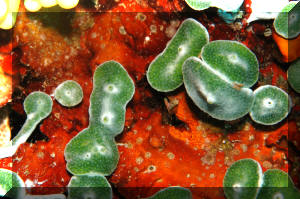
|
Bigger PIX:
The images in this table are linked
to large (desktop size) copies. Click on "framed" images
to go to the larger size. |
|
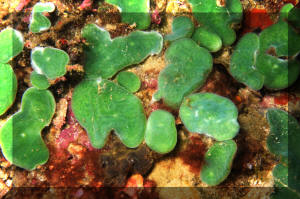
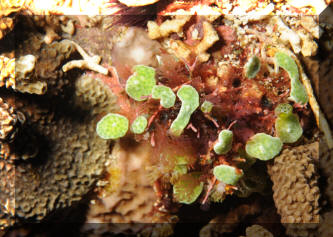
|
Genus Distaplia:
| Distaplia corolla, Button Tunicate. Small
(1/4" or less) oval individuals with one larger outflowing
opening. Generally grow in small clusters as these are in Cozumel.
Tropical West Atlantic. Found growing on dead coral. Orange or
purple in color. |

|
Bigger PIX:
The images in this table are linked
to large (desktop size) copies. Click on "framed" images
to go to the larger size. |
|

|
Genus Eudistoma:
| Eudistoma cf. gilboviride (Sluiter
1909). Light to bright green with yellow overall mottling. West
Pacific; Australia, Indonesia, Melanesia. Here in S. Sulawesi. |

|
| Eudistoma obscuratum Black Condominium Tunicate.
Globular colony with siphon openings surrounded by white. Roatan 2017 |
%20MD.JPG)
|
| Eudistoma sp. Colonies as smooth rounded
masses. Typically cream, lighter grey with darker grey markings. N.
Sulawesi image. |
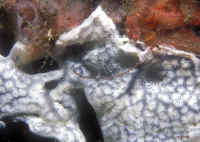
|
| Eudistoma sp. Heron Island, Capricorn Group,
Queensland, Australia. |
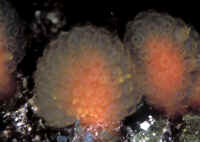
|
Genus Eusynstyela:
| Eusynstyela cf. misakiensis (Watanabe &
Tokioka 1972). Indonesia, New Caledonia, Japan. Zooids about 1 cm.
long placed next to each other, with a conspicuous white mark
between the siphons. Typically orange-red to purplish in
color. Pulau Redang, Malaysia image. |
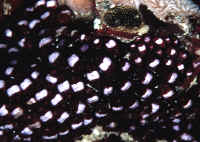
|
Bigger PIX:
The images in this table are linked
to large (desktop size) copies. Click on "framed" images
to go to the larger size. |
|
%20MD.JPG)
|
|
Eusynstyela sp. the last possibly latericus (Sluiter 1904).
Apricot colored, about 1 cm., bloated appearing zooids. Indo-West
Pacific. Fiji and Red Sea images.
|
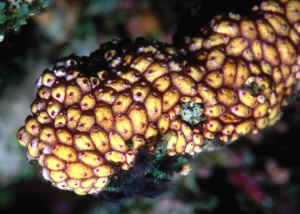 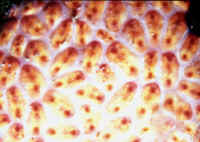
|
Bigger PIX:
The images in this table are linked to large (desktop size) copies.
Click on "framed" images to go to the larger size. |
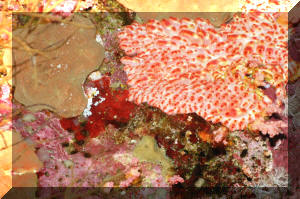
.JPG)
MD.JPG)
%20MD.JPG) |
Genus Herdamania:
| Herdamania momus (Savigny 1816). Western
Atlantic, Indo-Pacific, incl. Red Sea. To 10 cm. overall. Globular
in shape, solitary, with flared oral siphons. Most are tan in color
with red mottling. Look for the shrimp, Pontonia sibogae
living in its branchial sac. N. Sulawesi. |
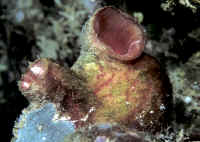 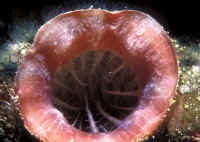
|
| Verticals (Full/Cover
Page Sizes Available) |
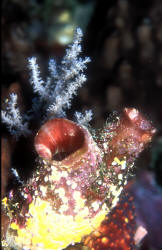 |
Bigger PIX:
The images in this table are linked
to large (desktop size) copies. Click on "framed" images
to go to the larger size. |
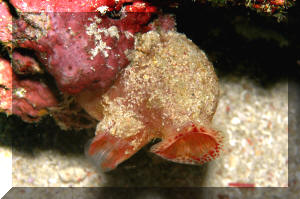
%20MD.JPG) |
To: Pt. 1,
Pt. 2,
Pt. 4,
Pt.
5,
|
|

